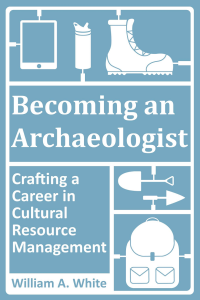 How many times have you heard this: “The Register of Professional Archaeologists (RPA) doesn’t mean anything; $100 a year! Why should I join?”
How many times have you heard this: “The Register of Professional Archaeologists (RPA) doesn’t mean anything; $100 a year! Why should I join?”
The lack of widespread professional certifications, aside from a college degree, is cited as a weakness of doing professional archaeology in the United States. It seems like it’s a problem in Europe as well.
Last month, Doug’s Archaeology posted the YouTube video of Austrian archaeologist Raimond Karl’s discussion at the Chartered Institute for Archaeologists Conference in Bangor, Maine titled “What do you mean you don’t recognize my qualification?”
His talk was about professional archaeology certification and the complications associated with the fact that there are no widely recognized qualifications for European archaeologists. As is the case in the United States, professional certifications are fractured along political boundaries. Who is and who is not a professional archaeologist varies across Europe. Who can do which archaeology-related tasks also varies. A combination of college diplomas and experience is necessary for all archaeology work in Europe, but the extent of the necessity and mixture of this combo varies by position.
This matters for aspiring archaeologists as well as those who wish to rise up in the ranks of the cultural resource management industry for several reasons. Understanding clear certification requirements makes it easier to set goals that might actually improve your career. Who wants to go back to school for a degree that isn’t going to help you get a better position? As cultural resource management expands, it also helps companies know who they need to hire. As Dr. Karl describes, scholarship is not always transferrable. You may not be able to use a PhD you hired to launch your company’s Leicester branch to do work in Malmo. Finally, revealing the complexities of certificatory requirements helps us identify inconsistencies that could impact our work.
European Archaeology Certificatory Requirements—An extremely brief introduction
Archaeology requires a combination of experience and education. The blend of these two elements varies depending upon what job you are applying to:
You see, in this world there’s two kinds of people, my friend… You dig. (The Good, the Bad, the Ugly [1966])
Supporting the base of the European archaeology pyramid are the “diggers.” These are the folks that actually do the archaeology. Archaeologists prefer diggers with experience and a college degree but, unlike in the case of archaeological field techs in the United States, there are no real requirements that diggers have degrees.
From what I’ve discerned from this talk and other conversations with other archaeologists who have worked in Europe, diggers only need to be able to dig. As frequently happens to archaeo field techs in the U.S., diggers aren’t really consulted in what’s going on at the site or in the dirt. These interpretations are left up to the “real” archaeologists (i.e. field directors, crew chiefs with college degree [especially those with graduate degrees and peer-reviewed publications]).
Where does the college degree come into play?
Crew chiefs, field directors, and other mid-level managers are expected to have experience and a college degree. Depending upon the country, these folks might need to have a Master’s or PhD. As is the case in the U.S., these folks are considered “real” archaeologists—whether they know how to interpret sediments or not. The experience requirement may include excavated sediments or just working with diggers who have excavated. Most of the time, crew chiefs are diggers and supervisors.
It’s the college education that sets these folks apart from the diggers. It is also this degree that allows them to contribute in a different way than the diggers. Dr. Karl desribes how some countries only issue certain kinds of permits to archaeologists with a degree. In some cases, this can be very specific. For example, geophysical surveys in Austria are only issued to archaeologists regardless of how well they know geophysical survey. An archaeologist must be there even if they don’t know what they’re doing.
What’s a PhD Good for?
Mainly academia but, increasingly, also for CRM. In Academia, it sounds like you need to do much more than a PhD if you want to teach in academia. And, that more does not necessarily mean more archaeology.
Dr. Karl explains that archaeology academicians are expected to have at least one PhD, possibly more than one, AND a massive peer-reviewed volume (to the tune of 300,000 words!) In addition to explaining why European archaeology books have a lot of words but tend to say very little (which contrasts with U.S. archaeology books that say little and have slightly fewer words), it also does much to explain how academicians have taken action to save their privilege and position in archaeology.
A PhD + an exhaustive, massive edited volume on an extremely minute topic = a very small pool of individuals that could ever do that job.
In addition to getting certifications and helping pave a way into academia, I wonder if there are any other benefits to getting a PhD in archaeology for a European? European archaeos: Throw me a lifeline if you can.
Who values these certifications?
The worst part about this whole certification is: You can be certified in one organization but not in any of the others. This brings us back to how the RPA is not the baseline for archaeology professionalism in the United States. You would think that belonging to the national register of professionals in your industry would be proof enough that you meet a widespread and accepted definition of professionalism. You might also think that it would be impossible to do archaeology if you were not a pro. This is not the case in the United States and it isn’t in Europe either.
The RPA is one of many metrics used to evaluate the qualifications of an archaeologist. The RPA’s metrics are accepted by many companies, but there are other qualifications that my take precedent including:
- The Secretary of Interior’s Standards for Archaeology.
- Qualifications of a government agency (For example, experience with the agency’s reporting standards).
- Local qualifications (For example, experience with local site recordation standards).
Other qualifications required by the country in which you will be working like those mentioned by Dr. Karl. Depending on the archaeologist’s position in the hierarchy and the requirements of the funding organization, this meshwork of certifications tend to dovetail; however, sometimes they do not.
There will never be a time when we all agree on who is and who is not an archaeologist. The “Primacy of Education” model prevents us from attributing this professional title to those among us who do not have access to higher education. It also considers certain types of learning more “appropriate,” ”professional,” or “significant” than others. Archaeology practitioners with traditional knowledge and lots of field experience suffer when we consider education more important than experience.
Similarly, we must create some sort of professional qualifications. I’m certain that RPAs, CIfAs, and other archaeology professionals do not want to be mistaken for the proprietors of Nazi War Diggers, American Diggers, or Antique Archaeology. Pursuit of knowledge, no matter how impure, is central to what we do as archaeologists. Digging up stuff to sell on eBay is not part of our professional milieu.
Identify a goal and shoot for it
A combination of experience and education is part of being a professional archaeologist. Each professional archaeologist qualifications scheme calls for this. For better or worse, its what we know, what we have, and who we are. However, the atomized way these classifications are applied around the world complicate us creating a definition for ourselves. The recent episode of the CRM Archaeology Podcast shows the definition of CRM job descriptions vary across the United States. This atomized state shows no signs of abating.
It would be nice if we had a universal definition of professional archaeologist but that is not the case. I’m not sure if that is possible. Those of us working in the industry should carefully study the qualifications required to be considered an archaeologist in the regions in which we work because that will help create a goal towards which we can work. Aim for the professional qualifications in at least one region, if not more, and shoot for your target. Rather than wishing for universal qualifications, work towards achieving the qualifications you need to further your archaeology career.
Write a comment below or send me an email.
 Having trouble finding work in cultural resource management archaeology? Still blindly mailing out resumes and waiting for a response? Has your archaeology career plateaued and you don’t know what to do about it? Download a copy of the new book “Becoming an Archaeologist: Crafting a Career in Cultural Resource Management” Click here to learn more.
Having trouble finding work in cultural resource management archaeology? Still blindly mailing out resumes and waiting for a response? Has your archaeology career plateaued and you don’t know what to do about it? Download a copy of the new book “Becoming an Archaeologist: Crafting a Career in Cultural Resource Management” Click here to learn more.
Check out Succinct Research’s contribution to Blogging Archaeology. Full of amazing information about how blogging is revolutionizing archaeology publishing. For a limited time you can GRAB A COPY FOR FREE!!!! Click Here
 “Resume-Writing for Archaeologists” is now available on Amazon.com. Click Here and get detailed instructions on how you can land a job in CRM archaeology today!
“Resume-Writing for Archaeologists” is now available on Amazon.com. Click Here and get detailed instructions on how you can land a job in CRM archaeology today!
 Small Archaeology Project Management is now on the Kindle Store. Over 300 copies were sold in the first month! Click Here and see what the buzz is all about.
Small Archaeology Project Management is now on the Kindle Store. Over 300 copies were sold in the first month! Click Here and see what the buzz is all about.
Join the Succinct Research email list and receive additional information on the CRM and heritage conservation field.
Get killer information about the CRM archaeology industry and historic preservation.



